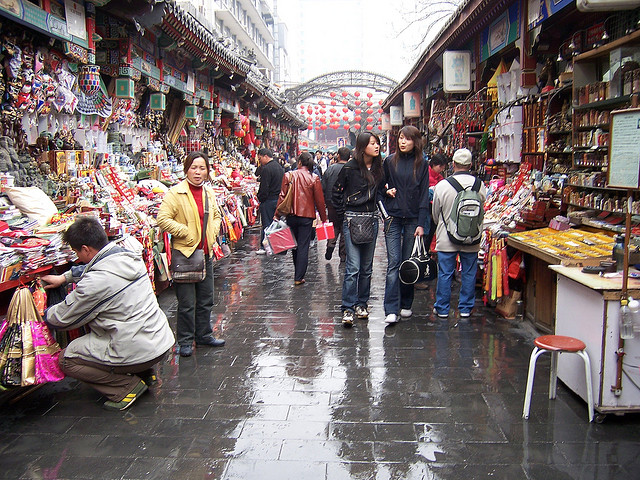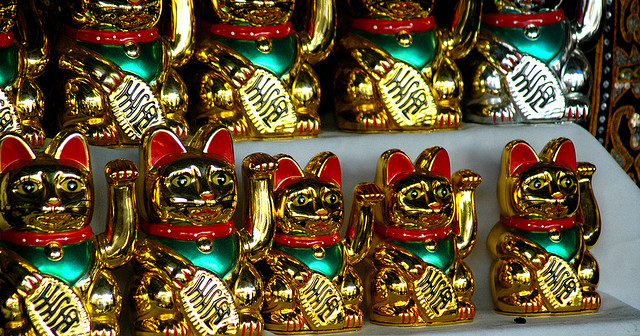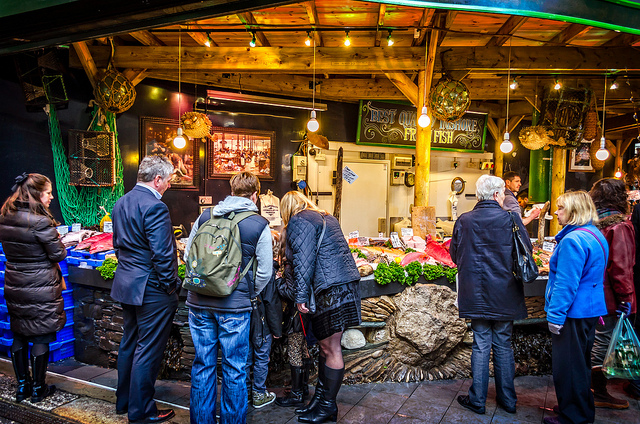Haggling is undoubtedly a true skill and is a great way to fend off the increasing cost of, well, everything.
According to many people, Brits are just too polite to get involved in a bargain battle with a seller, but haggling can save you money that could be spent on another part of your holiday.
China’s markets, which sell a range of products such as clothes, gifts, art, jade and lots more, offer the perfect opportunity for visitors to haggle. As well as having a go at shopping like the locals, you can in some cases buy a gift for half the price of the initial cost.
So if you are heading on any China holidays in the near future, then read on to find out some strategies and tips from the Wu Crew and our travel guides that could help you when bargaining in China’s markets.
Find an open-air market

It’s often safe to think that everything being sold at a market in China is up for negotiation. The exception to the rule is in shopping centres.
Don’t feel embarrassed or guilty
Some travellers feel guilty and avoid haggling, instead paying the first price offered. You shouldn’t feel embarrassed or guilty about haggling. It is part of Asian culture and sellers at markets in China expect both Chinese and foreign customers to bargain with them.
Don’t just buy the first thing you see
If you are looking for a particular item, e.g. jade, and you see it at a stall, don’t just rush over there and buy it. Instead you should always have a look around to see how much it costs in a number of places, but if you really don’t think that you will find a similar item elsewhere, then you should consider buying the item there and then.
Have a maximum price in your head

Before you start to negotiate the price of an item you should have a maximum price that you would pay for the item fixed in your head. If the product is more expensive than this and the seller will not budge on the price, you should walk away. They may decide to come down in price if you start to leave, or you may be better off looking elsewhere.
Speak a bit of their language
It is advisable to speak a little bit of the Chinese language, which can be difficult as there are so many dialects in China! However, learning how to say everyday phrases such as “hello” or “how much” will show that you are a clued-up tourist.
It will keep the vendor on their toes as they will not be sure how long you have been in the area and that will, in turn, make them more likely to offer a sensible price.
Check out our Chinese phrases cheat sheet for the essential Mandarin phrases for shopping and bartering.
Pretend you don’t have that much money
By hiding some of your money in a different part of your wallet before approaching the stall, or by putting some of it in your pocket, you might be able to grab a bargain.
Vendors will undoubtedly want the best price for their business, so if you say you only have a certain amount and they can see that your wallet reflects that, they might reduce the price of a product so that you can buy it.
Ben Briggs, Marketing Manager at Wendy Wu Tours, adds:
“I always haggle with the understanding that the shopkeeper will not sell something unless he is making enough profit for himself, so with that thought in mind I usually halve the advertised price and start bargaining from there!”
Buy in bulk

If a vendor will not reduce his or her price for a certain item, then have a look at their stall and see if there are any other products that you or a family member would like. By purchasing a number of items you will have more weight to bargain on price.
Those that are going on long tours of China will have ample time to browse through markets in different cities, so it is also worth not buying in bulk until the end of your trip. This will save you carrying your gifts the entire holiday and will give you an insight into how much products cost.
Know your exchange rate
Knowing how much it will actually cost you in your home currency can greatly influence your decision as you’ll have a better understanding of its worth – particularly as the numbers are very different. As of August 2015, £1 equates to 9.88 Chinese Yuan. It is also worth jotting down how much Chinese Yuan makes £10, £20, £50 and £100 so that you can easily work out how much things cost in shops as well as the markets.
Don’t show too much interest
Chinese sellers might not be able to understand everything that you are saying, but they will be watching your reactions.
Try to adopt a ‘take it or leave it’ attitude to make the seller think that you are prepared to walk away, even if it is something that you are desperate to buy.
Junior Crichlow, Operations and Customer Service Assistant at Wendy Wu Tours says:
“When you locate an object you want to purchase, the best stance is to act disinterested in the piece and ask for a ‘discount’! Start low, be firm and engage with a sense of humour.”
The walk away

Last, but certainly not least, is the classic walk away – a more serious version of the above tip. If, after a few rounds of bargaining, you have managed to get the vendor down from Y600 to Y400, then just slowly walk away. It is more than likely that the seller will offer you their best price, which could be Y300. You can then give yourself a pat on the back!
Junior Crichlow, added:
“I recall being interested in a product in a market, after intense haggling we reached a stale-mate and went our separate ways. Only for the neighbouring market stall to agree to half the price I was originally offered!”
Do you have any haggling tips? If so, please share your tactics in the comment section below.
 Visit China with the UK’s leading China Experts, Wendy Wu Tours. Our award winning escorted, fully inclusive China tours visit all the major sights of China for an unforgettable holiday.
Visit China with the UK’s leading China Experts, Wendy Wu Tours. Our award winning escorted, fully inclusive China tours visit all the major sights of China for an unforgettable holiday.
We also have amazing tours to Cambodia, Vietnam, Laos, Japan, India and beyond…
Image Credit: McKay Savage, Japanexpertna.se, Sam Sherratt, Garry Knight (flickr.com)
 “I always haggle with the understanding that the shopkeeper will not sell something unless he is making enough profit for himself, so with that thought in mind I usually halve the advertised price and start bargaining from there!”
“I always haggle with the understanding that the shopkeeper will not sell something unless he is making enough profit for himself, so with that thought in mind I usually halve the advertised price and start bargaining from there!”




















